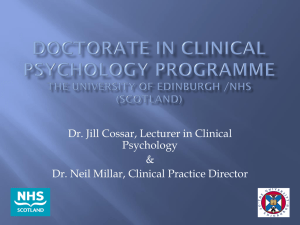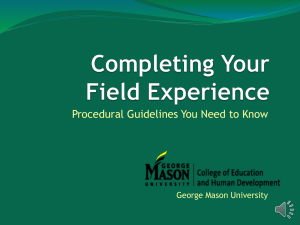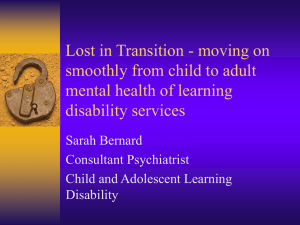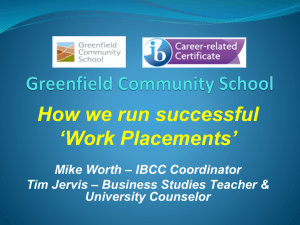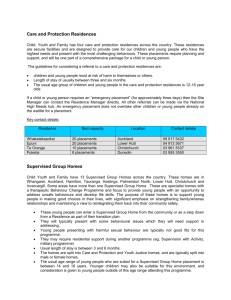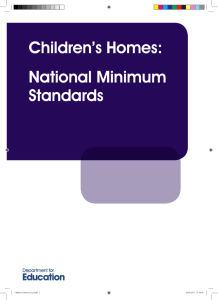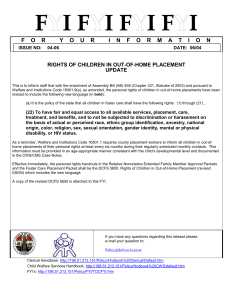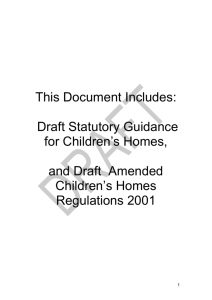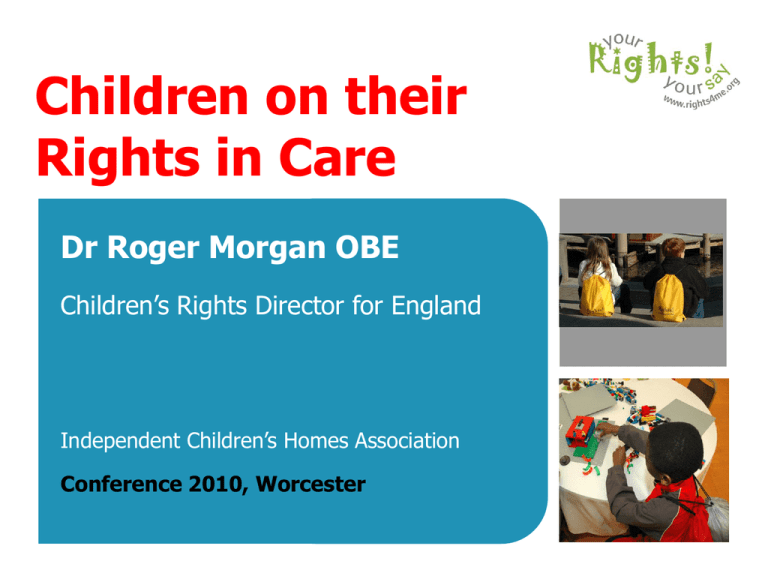
Children on their
Rights in Care
Dr Roger Morgan OBE
Children’s Rights Director for England
Independent Children’s Homes Association
Conference 2010, Worcester
The Children’s Rights Director:
(commercial slide!)
Independent post with statutory personal functions
(Not the Children’s Commissioner!)
Including consulting children without third party permissions
Hosted by Ofsted (previously DH, then NCSC, then CSCI)
Children and young people in care, or receiving social care support,
or in residential education, or family centres, or care leavers,
regarding their rights and welfare
‘Ascertaining’ children’s views
Advising on rights and welfare
Raising issues I consider significant
Input to Ofsted and to Government
A ‘Right’ is something you should
always be able to do, to have, to
know, to say or to be protected from
Sources of Children’s Rights in the UK
UN Convention on the Rights of the Child
Human Rights Act
UK Primary Legislation on children
UK Secondary Legislation – Regulations
Statutory Guidance
National Minimum Standards (where applicable)
Legal case law
Children’s Rights Director statutory advice
Different approaches to rights
Protective
Pragmatic
Libertarian
THE NINE BASIC RIGHTS FROM
CHILDREN’S RIGHTS CONSULTATION 2010
The right to be safe from harm
The right to well-being
The right to be alive and well
The right to learning and education
The right to enjoy life
The right to be oneself
The right of all people to be treated equally and fairly
The right to socialise with other people
The right to have a say in one’s own life
CHILDREN’S TOP TEN RIGHTS
To be protected from abuse
Not to be treated or punished in a way that is cruel or meant to make me
feel bad about myself
Special help for any child with a disability
To have my private letters, phone calls, emails & messages kept confidential
To have an education
To be helped to keep alive and well
Not to be discriminated against because of my race, colour, sex, language,
disability, language or beliefs
To have privacy
Not to be bullied
To keep in touch with my parents, grandparents, brothers and sisters if I
want to and they want to, wherever we all live
CHILDREN’S TOP TEN RESPONSIBILITIES
Responsibility for your own behaviour and actions
Making use of your education
Showing respect to others
Responsibility for your own safety
Looking after others
Looking after yourself
Your own health and hygiene
Carrying out your responsibilities around the house
Looking after the environment
Giving your opinion
Service rights in the UK
It shall be the duty of a local authority looking after any child
(a) to safeguard and promote his welfare; and
(b) to make such use of services available for children cared for
by their own parents as appears to the authority reasonable in
his case.
The duty of a local authority under subsection (3)(a) to
safeguard and promote the welfare of a child looked after by
them includes in particular a duty to promote the child’s
educational achievement.
Children Act 1989 Section 22(3)
The consultation right in the UK
UK Children Act 1989 –
ascertain and give due consideration to the
[individual] child’s wishes and FEELINGS, subject to
[age] and understanding
Decisionmaking –
the individual’s rights in context
In day to day decisionmaking, staff demonstrate an
appropriate balance between:
•
•
•
Each child’s wishes and preferences
•
The protection of others (including the public) from
harm
The needs of individual children
The needs of the group of children resident at the
time
National Minimum Standards for Children’s Homes
The carer’s default duty
A person who does not have parental responsibility for a
particular child; but has care of the child,
may (subject to the provisions of this Act) do
what is reasonable
in all the circumstances of the case
for the purpose of safeguarding or promoting the child’s
welfare.
Children Act 1989, Section 3(5)
Children on children’s homes
Best things are the staff, activities and making new friends
A good children’s home is spacious, in good repair, homely, has
individual rooms and has plenty to do
It is near to local activities and shops and not in a bad area
Biggest danger is bullying and other young people
Main factor helping with education is the staff, then incentives
Worst things are missing your family, rules and living with people
you don’t get on with
Good children’s home staff are kind, caring, listen, help with
problems, are happy, not moody and are easy to get on with
Main factor keeping children safe from danger and bullying is the
staff
Main factor in staying healthy is diet, then exercise
Main preparations for the future are learning practical skills and
support from staff
Children on secure children’s homes
A safe place – out of trouble, safe from bullying inside, safe from
people outside who would harm you
‘Welfare’ and ‘criminal’ divide
Loss of freedom, away from family and friends, boredom
Staff are key
Having your own room
Rooms and spaces too small, ventilation a problem
Food, activities, ability to socialise all important
Education seen as either good or bad
Protected from bullying, but affected by others ‘kicking off’
Miss smoking and usual teenage activities
Fear of returning to trouble on leaving
Core points …
Please don’t always believe an adult over a child
Always take what a child says as seriously as what
an adult says
Please don’t make a looked after child ‘stand out’
A child has a right to have what they are entitled to
Policy rights sought by children (1)
Treat me as an individual, not one of a group
Don’t apply targets when deciding for individuals
Let me get to know a placement before I move in – don’t place
me with strangers
Keep giving me information
Have an agreement about touching or being alone with a child
Check for risky times and places for bullying or dangers
Give us a choice of staff member to go to for help or advice
Keep asking us about our views and concerns
Keep me informed
Make sure I know what I am entitled to and what I’m not
Policy rights sought by children (2)
Only restrain me to stop me injuring myself or someone else or
seriously damaging property
Don’t restrain me as a punishment or to make me do what I am
told
Don’t hurt me when you restrain me
Know how to calm me down when I kick off
Only give people information about me if they really need to know
Make sure I can talk to someone independent when I have run
away
If I run away, check whether I ran just to have fun, or to go
somewhere I want to be, or to get away from something here
Care and prejudice …
Being from care makes others treat you differently – sometimes better,
sometimes worse
Main sources of difference are that you live away from family and have had
different life experiences
Public sees children from care, and especially from children’s homes,
negatively
45% of children in care worry about others knowing they are from care
Being from care is a trigger for being bullied
Later, being from care can make getting accommodation or employment
difficult
Siblings …
81% of those with at least one brother or sister
also in care had been separated from at least one
brother or sister
Separation of siblings more likely for those in
children’s homes than those in foster care
Children request visits, phone contact, email
contact, and photos
Grading contribution to decisions
The Decision Score …
1.
2.
3.
4.
5.
6.
7.
8.
9.
10.
You’ve no preference – I decide
I decide – but I know what you want me to say
I can say no to what you want, and that will stop you
If I want to stop you, I’ve got to argue my reasons with you
I can object and you will take some notice of that
You’ll only listen if I can convince you to change your mind
I can object, but I don’t think that will make any difference
You’ll decide your way unless something serious happens
You’ve already decided whatever anyone else says
There is no decision – it is the same policy for everyone
I do not know how this gets decided - or who decides
Assessing understanding for decisions
Once it’s fully explained – does the young person understand:
The question?
Can they weigh things up for themselves?
The reasons behind it?
What the alternatives are?
What will happen if they decide one way or the other?
Can they say what they want for themselves?
Can they keep the same view, not keep changing it?
Findings from Children’s Care Monitor 2009
50% of children are usually or always asked their opinions
about things that matter to them
48% say their opinions, when asked, usually or always
make a difference to decisions about their lives
69% say adults usually or always tell them when changes
are going to happen in their lives
Care planning (from 2009 Monitor)
73% stated they had a care plan
76% of those knew what was in their care plan
65% of them had a say in what is in their care plan
68% of them agreed with their care plan
82% of them said their care plan was being fully kept to
Children on placement
Can there be a choice of placement, and a backup if I don’t
settle in the first one?
54% considered their last school change because of
placement change turned out to be in their best interests
68% of placement changes were in the child’s best
interests
81% say they are currently in the right placement
PLANNING, PLACEMENT & REVIEW
REGULATIONS – issues children raised
Avoid moving schools in years 10 or 11
Placements not to end other than through a review (other
than emergency)
Placements usually near home
Placements usually with brothers and sisters
Questions or Standards for independent accommodation
Social worker visits in first week, 6 weekly for first year,
then 3 monthly [NB children’s view is monthly]
Seeing their social worker alone
More powerful Independent Reviewing Officers
Overnight stays
And a final message from a care leaver …
“I want to be free of my past,
better than my present,
and always ambitious for my future.
The only thing that can help me get there
is funding and my own will power”

